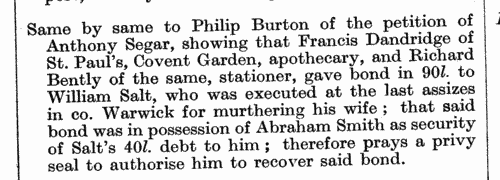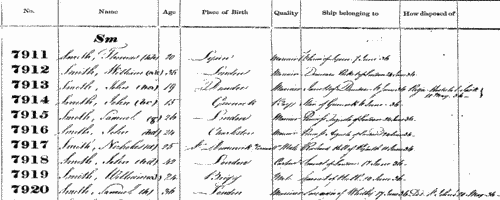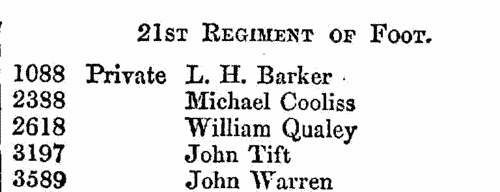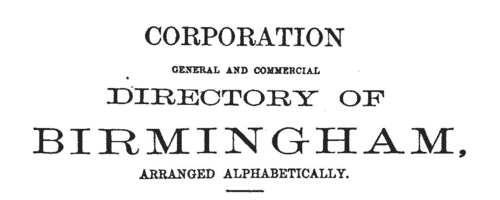Mccullough Surname Ancestry ResultsOur indexes 1000-1999 include entries for the spelling 'mccullough'. In the period you have requested, we have the following 104 records (displaying 1 to 10): Single Surname Subscription | | | Buying all 104 results of this search individually would cost £588.00. But you can have free access to all 104 records for a year, to view, to save and print, for £100. Save £488.00. More... |
These sample scans are from the original record. You will get scans of the full pages or articles where the surname you searched for has been found. Your web browser may prevent the sample windows from opening; in this case please change your browser settings to allow pop-up windows from this site. Treasury and Customs Records
(1685-1688)
Government accounts, with details of income and expenditure in Britain, America and the colonies
MCCULLOUGH. Cost: £4.00.  | Sample scan, click to enlarge

| Masters of Merchantmen at Charleston (1787)
The custom house at Charleston, South Carolina, reported ships entered inwards, cleared outwards and sailed. These give the type of vessel, the name of the vessel, surname of the master, and (for ships arriving) whence they had come, or (for ships departing) their proposed destination. Most of the traffic was with other American ports (over 700 ships a year), Britain (about 150), and the West Indies.
MCCULLOUGH. Cost: £8.00.  | Sample scan, click to enlarge

| Masters of Merchantmen (1788)
The Columbian Herald of Charleston carried regular shipping news about movements and mishaps of merchant vessels. These reports typically give the type of vessel, the name of the vessel, surname of the master, and (for ships arriving) whence they had come, or (for ships departing) their proposed destination. Most of the traffic was with other American ports (over 700 ships a year), Britain (about 150), and the West Indies.
MCCULLOUGH. Cost: £8.00.  | Sample scan, click to enlarge

| Masters of Merchantmen at Charleston (1788)
The custom house at Charleston, South Carolina, reported ships entered inwards, cleared outwards and sailed. These give the type of vessel, the name of the vessel, surname of the master, and (for ships arriving) whence they had come, or (for ships departing) their proposed destination. Most of the traffic was with other American ports (over 700 ships a year), Britain (about 150), and the West Indies.
MCCULLOUGH. Cost: £8.00.  | Sample scan, click to enlarge

|  British merchant seamen
(1835-1836) British merchant seamen
(1835-1836)
At this period, the foreign trade of ships plying to and from the British isles involved about 150,000 men on 15,000 ships; and the coasting trade about a quarter as many more. A large proportion of the seamen on these ships were British subjects, and so liable to be pressed for service in the Royal Navy; but there was no general register by which to identify them, so in 1835 parliament passed a Merchant Seamen's Registration Bill. Under this act this large register of British seamen was compiled, based on ships' crew lists gathered in British and Irish ports, and passed up to the registry in London. Each seaman was assigned a number, and the names were arranged in the register by first two letters of the surname (our sample scan shows one of the pages for 'Sm'); in addition, an attempt was made to separate out namesakes by giving the first instance of a name (a), the second (b), and so on. But no effective method was devised to prevent the same man being registered twice as he appeared in a second crew list; moreover, the original crew lists were clearly difficult for the registry clerks to copy, and some of the surname spellings appear to be corrupted. A parliamentary committee decided that the system devised did not answer the original problem, and this register was abandoned after less than two years: but it is an apparently comprehensive source for British merchant seamen in 1835 to 1836. The register records the number assigned to each man; his name; age; birthplace; quality (master, captain, mate, 2nd mate, mariner, seaman, fisherman, cook, carpenter, boy &c.); and the name and home port of his ship, with the date of the crew list (usually at the end of a voyage). Most of the men recorded were born in the British Isles, but not all (for instance, Charleston and Stockholm appear in the sample scan). The final column 'How disposed of' is rarely used, and indicates those instances where a man died, was discharged, or deserted his ship during the voyage.MCCULLOUGH. Cost: £8.00.  | Sample scan, click to enlarge

|  London Policemen
(1830-1842) London Policemen
(1830-1842)
The Metropolitan Police Register of Joiners (MEPO 333/4) lists policemen joining the force through to 31 December 1842 (to warrant number 19892). The register is alphabetical, in so far as the recruits are listed chronologically grouped under first letter of surname. It is evidently a continuation of a similar earlier register, not closed until its alphabetical sections were filled: consequently, there are no entries in this register for the initial letters N, O, Q, U, V, X, Y or Z; and the sections of this register start at different dates - A 18 April 1840 (warrant number 16894); B 11 December 1830 (5570); C 7 September 1830 (4988); D 27 May 1833 (8445); E 15 December 1838 (14476); F 30 March 1832 (7372); G 1 December 1835 (11,184); H 25 April 1832 (7457); I and J 13 February 1837 (12449); K 2 January 1838 (13457); L 3 October 1834 (9905); M 15 November 1832 (7999); P 4 October 1831 (6869); R 4 September 1837 (13021); S 30 March 1835 (10366); T 6 April 1840 (16829); W 30 December 1833 (9096). The register gives Date of Appointment, Name, Number of Warrant, Cause of Removal from Force (resigned, dismissed, promoted or died), and Date of Removal. Although the register was closed for new entrants at the end of 1842, the details of removals were always recorded, some being twenty or more years later. Those recruits not formerly in the police, the army, or some government department, were required to provide (normally) at least two letters of recommendation from persons of standing, and details of these are entered on the facing pages: the names in these are indexed separately - this index refers only to the police constables. Where a recruit was only recently arrived in the metropolis, the names and addresses of the recommenders can be invaluable for tracing where he came from.MCCULLOUGH. Cost: £8.00.  | Sample scan, click to enlarge

| British soldiers wounded at Inkerman
(1854)
Sebastopol in the Crimea was the great Russian naval arsenal on the Black Sea. A combined assault by British, French and Turkish troops resulted in the reduction of Sebastopol and led to the Treaty of Paris of 27 April 1856, guaranteeing the independence of the Ottoman Empire. In the battle of Inkerman, of November 1854, the Russian troops made an ultimately unsuccessful attack on the allied army. In December the War Office issued lists of soldiers killed and wounded at Inkerman: there are separate returns for 2 to 6 November, 7 to 20 November, and 21 to 26 November, as well as one for soldiers missing, and one for members of the Naval Brigade killed and wounded. This is the list of British soldiers wounded at Inkerman 2 to 6 November 1854.MCCULLOUGH. Cost: £6.00.  | Sample scan, click to enlarge

|  British infantry fighting in China
(1860) British infantry fighting in China
(1860)
The China Medal was awarded to soldiers and sailors who took part in the prosecution of the war against the Chinese from 1856 to 1860. Separate clasps were awarded for men who had been in receipt of the China Medal of 1842; for being actually present at Canton on 28 and 29 December 1857, when that city was bombarded and finally captured; for being actually engaged in the operations which ceased with the first capture of the Taku Forts, 20 May 1858, and led to the Treaty of Tientsin; for being actually present at the capture of the Taku Forts 21 August 1860; and for being actually present before Pekin the day the gate of that city was given up to the allied (British and French) army, viz. on 13 October 1860. The 1st battalion, the 3rd (East Kent) Regiment of Foot (the Buffs), based in Limerick, embarked for Malta 2 April 1851. The battalion took part on in the capture of the Taku Forts.MCCULLOUGH. Cost: £8.00.  | Sample scan, click to enlarge

| Residents and Traders in Birmingham
(1861)
William Cornish's Corporation General and Trades Directory covered Birmingham, Coventry and the towns of the Black Country. The Birmingham section contains both street lists and this general alphabetical directory. MCCULLOUGH. Cost: £4.00.  | Sample scan, click to enlarge

| Science Schools and Classes: Elementary Examination: Class Lists
(1869)
The Science and Art Department of the Committee of Council on Education published these class lists giving the names of all the successful candidates in the examination of science schools and classes taken in May 1869. The candidates were of three levels: honours; second stage or advanced examination; third stage or elementary examination. Twenty-three subjects were offered. These are the lists for the elementary examination. The tables, arranged subject by subject, give the candidate's full name (surname first), age, and occupation - or, in the case of those not yet of working age, father's occupation, preceded by (f.). Many candidates sat and were successful in more than one subject, and so appear in more than one list. The subjects are: I. Practical, Plane and Solid Geometry; II. Machine Construction; III. Building Construction; IV. Elementary Mathematics; V. Higher Mathematics; VI. Theoretical Mechanics; VII. Applied Mechanics; VIII. Acoustics, Light, and Heat: IX. Magnetism and Electricity; X. Inorganic Chemistry; XI. Organic Chemistry; XII. Geology; XIII. Mineralogy; XIV. Animal Physiology; XV. Zoology; XVI. Vegetable Anatomy and Physiology; XVII. Systematic and Economic Botany; XVIII. Mining; XIX. Metallurgy; XX. Navigation; XXI. Nautical Astronomy; XXII. Steam; XXIII. Physical Geography. MCCULLOUGH. Cost: £6.00.  | Sample scan, click to enlarge

|
Research your ancestry, family history, genealogy and one-name study by direct access to original records and archives indexed by surname.
|













